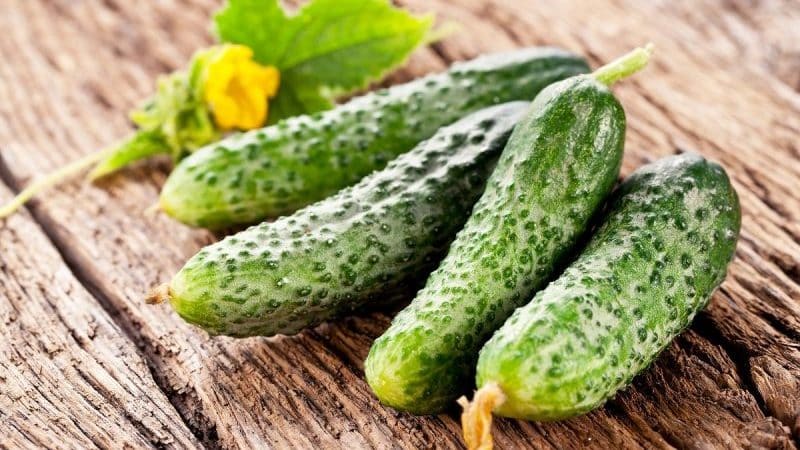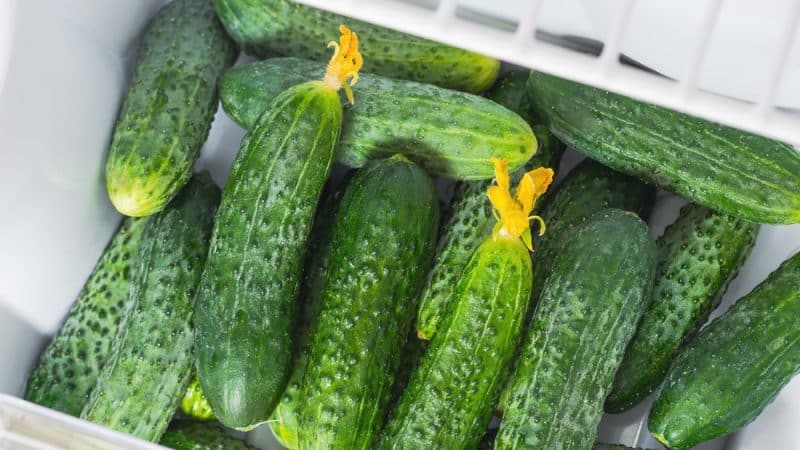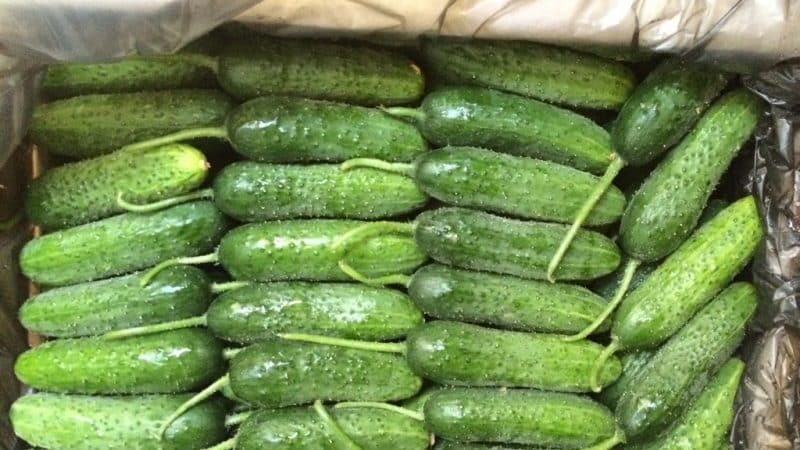How to store fresh cucumbers so that they do not spoil for as long as possible
Cucumbers rightfully occupy one of the leading places in popularity among vegetables. Freshness and useful substances allow them to be used not only in salads and preparations, but also in cosmetology.
But summer passes quickly, and in winter they can only be enjoyed canned. Stores sell fresh vegetables in winter, but their prices are higher than in summer, and the taste of greenhouse vegetables is inferior to those grown in season. In this article you will learn how to select and keep cucumbers fresh for the winter at home. Where can you keep this vegetable until spring so that it does not lose its beneficial qualities?
How to properly store fresh cucumbers
Before you begin the preservation procedure, you need to select the right fruits.
Attention! Cucumbers grown in a greenhouse are not suitable for long-term storage. Choose ground fruits with thick skin.
Selection and preparation of vegetables
For those who are going to store vegetables grown in their own garden, it will not be difficult to select good fruits. But when buying cucumbers in the market you should pay close attention to their quality.
For long-term storage of fresh vegetables, you need to choose freshly picked fruits. Lying down and withered ones are absolutely not suitable. Choose medium-sized fruits, as small ones will quickly spoil and large ones will taste bitter.
Pay attention to the presence of stains and damage on the fruits - it is also better not to use such specimens.
 Often, when buying cucumbers at the market, you may find that there are droplets of water on them. This means that the vegetables were kept in water for some time to give them density. Under no circumstances should you purchase such fruits for long-term storage.
Often, when buying cucumbers at the market, you may find that there are droplets of water on them. This means that the vegetables were kept in water for some time to give them density. Under no circumstances should you purchase such fruits for long-term storage.
It is not recommended to wash vegetables before storing them, since they have natural protection against spoilage and rotting, which disappears upon contact with water.
Attention! Storing wet cucumbers leads to spoilage, rotting and the development of mold.
Before storage, the fruits should be dried in a well-ventilated place, but not in the sun - there they will lose their natural moisture.
Storage conditions and periods
Keeping cucumbers fresh at home for 3–5 days is not difficult, but this period can be extended to 3–5 months.
The basic rule for storing vegetables at home is maintaining the temperature: it should not exceed 15 °C and fall below 0 °C. With such indicators, vegetables are stored in the refrigerator, basement, pantry, or on the balcony.
Cucumber is a vegetable with a high water content, which tends to evaporate even at temperatures close to zero. By following our recommendations, you will preserve cucumbers until spring without significant loss of their natural moisture.
Storage options
There are many proven methods for long-term storage. Let's take a closer look at some of them.
In a refrigerator

The easiest storage option is to put the cucumbers in the refrigerator:
- In the compartment for storing vegetables. No additional preparation is required to store cucumbers in this compartment. Place fruits picked from the garden or purchased at the market in the refrigerator without rinsing them with water. They will keep in this state for 3–5 days.
- In a plastic bag. You can increase the shelf life to 1-2 weeks by using a plastic bag. Place dry vegetables in a bag, place damp gauze on top and store in the refrigerator.
- In an egg shell. Brush each fruit separately with egg white and leave to dry. Then put everything in glass jars or plastic containers and place it in the refrigerator. Do not use metal containers for storage. Egg white forms a protective layer on the fruit that does not allow oxygen to pass through, thereby preventing the cucumbers from rotting. With this method you will preserve them for up to 2 months.
- In water. A cucumber is 95% water, so it spoils if it loses moisture. Place the prepared cucumbers, tails down, in a non-metal container and fill with cold water. You should not pour a lot of water; it must be changed every day. As the cucumbers lose moisture, they will replenish it from the water at the bottom of the container. The shelf life of cucumbers in this form is 3-4 weeks.
In the apartment
You can also store vegetables at room temperature. With this storage method, cucumbers remain fresh for 2-3 days. Vegetables should be placed in a wooden box, cardboard box or plastic tray.
The air temperature in the room should not exceed 15 ° C, humidity - 90-95%. At temperatures below 10 °C, vegetables will last up to 10 days.
In the cellar
The longest storage time is provided by the basement. In it, the air temperature does not drop below 0 ° C, so vegetables are not frozen and remain until spring, retaining the maximum amount of nutrients. It is recommended to store the product in the basement in earthenware.

In sand
Place the prepared cucumbers in a bowl and cover with dry sand, cover with a lid and lower into the basement.For such purposes, it is better to dry sand in the oven. After drying, be sure to let it cool. Cucumbers prepared in this way can be stored for up to 7 months.
In a vacuum
Modern technologies make it possible to easily keep vegetables fresh and crispy for up to 3 months in an airless space, that is, a vacuum.
Soak the cucumbers for 6 hours in cold water to remove air. Then place it in a jar and close it with a special lid with a pump. Such a device can be purchased in the departments of appliances and household appliances for kitchens. It is possible to open the jar and close it again, creating a vacuum to continue storage.
In paper
Another storage method is in the basement in paper. Wrap each fruit separately in paper or a paper napkin and place in an open container. In this state, cucumbers will remain until the new year.
In the evaporation of vinegar essence
For this method you will need a non-metallic pan. Pour about one finger's worth of vinegar essence into the bottom of the pan. Place a wire rack on top, place the cucumbers on it in several layers and cover with a lid. The freshness of the fruit will last due to the evaporation of the vinegar essence.
In the bank
You can store cucumbers in a jar without resorting to the preservation process. To do this, rinse the vegetables with boiling water and dry them. Place chopped horseradish at the bottom of a clean, dry jar and fill with cucumbers. Close the lid tightly and lower it to the basement. These cucumbers should be stored for no more than 2 months.
Important! Regardless of which storage method you choose, cucumbers must be inspected every 2-3 days. Damaged copies must be removed.
Is it possible to preserve fresh cucumbers until winter?
Another way to store fresh cucumbers is freezing.Housewives do not use this method very often due to the fact that when defrosting, the product loses moisture and becomes limp and tasteless. However, this storage method is suitable for further use of cucumbers in preparing okroshka.
How to do it
To freeze cucumbers, rinse them thoroughly and dry them with a towel. After this, cut into cubes and divide into portions sufficient to prepare one pan of okroshka. Place each portion in a bag and place in the freezer for storage.
It is not recommended to defrost such a product. Place one portion of frozen cucumbers in the prepared okroshka and leave to brew for 10–15 minutes. When cucumbers are defrosted, they will not lose their beneficial properties and taste.
It is recommended to store frozen cucumbers in the freezer for no more than 12 months.
How not to store cucumbers and why
The most dangerous “neighbor” for ripe cucumbers during storage is ethylene. It helps accelerate the ripening of fruits and vegetables. However, cucumbers, after being picked from the garden, are not able to ripen. Instead, they turn yellow, lose liquid and become unfit for consumption.
All vegetables and fruits that contain ethylene are not recommended to be stored together with cucumbers. Such products include apples, pears, bananas, tomatoes, melons.
When storing cucumbers in plastic bags, do not close them tightly or make holes, then the product will last longer due to the air entering the bags. Condensation accumulates in a tightly closed bag, which leads to rapid rotting of vegetables.
General recommendations and useful tips
A few more useful, proven tips for storing cucumbers that will help when preparing the product:
- For long-term storage, choose fruits with thick green skin. Seeds (overripe) and yellowed are unsuitable for long-term storage.
- Do not try to preserve gherkins for a long time. They will quickly lose moisture and spoil, just like greenhouse varieties of cucumbers.
- Do not buy fresh vegetables from a very cold display case for long-term storage. Temperature changes accelerate the process of their deterioration.
- When storing vegetables, carefully monitor the temperature. At temperatures below zero, cucumbers soften and mucus appears on them.
Read also:
Where and how to store green tomatoes so that they turn red as quickly as possible.
What to do if the melon is not ripe: storage rules for fruit ripening.
Conclusion
All of the listed tips and recommendations for storing fresh cucumbers have been tested by a large number of housewives from all over the world. Choose the most convenient method for yourself and enjoy the taste of fresh cucumbers all year round. With a little effort, in winter you can treat yourself to a healthy and tasty piece of summer.